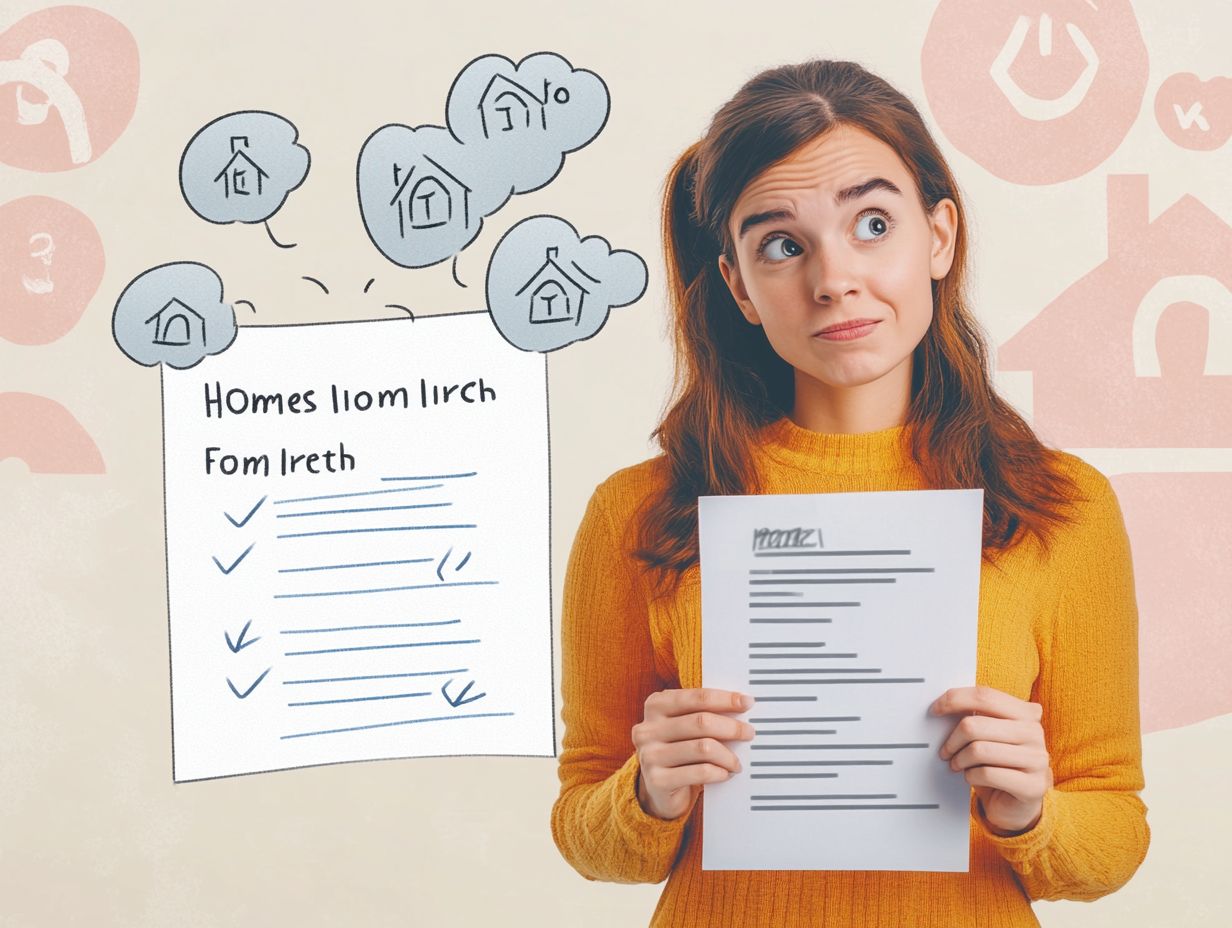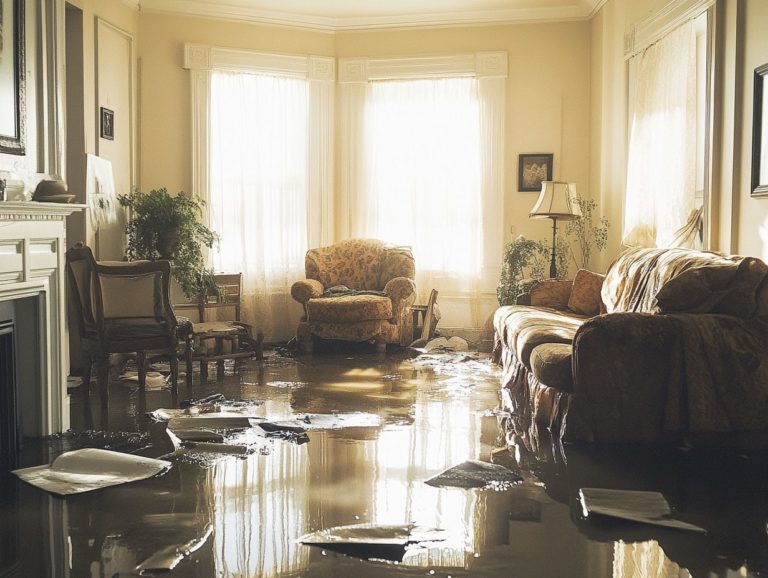Common Myths About Home Insurance Debunked
Home insurance serves as a vital safety net. Yet, many individuals harbor misunderstandings that could expose them to unnecessary risks.
From the misconception that it s exclusively for homeowners to the notion that all policies are essentially the same, these myths can lead to confusion and even financial hardship. This article aims to clarify what home insurance genuinely covers, dispel prevalent myths, and examine the factors that influence rates.
Whether you re a homeowner, renter, or landlord, grasping these realities is crucial for safeguarding your property and ensuring your peace of mind.
Contents
Key Takeaways:

Home insurance is not just for homeowners renters and landlords can also benefit from coverage.
Not all home insurance policies are the same different types of coverage offer varying levels of protection.
Home insurance is not just for natural disasters; liability coverage is an important aspect for all homeowners to consider.
Understanding Home Insurance
Grasping the nuances of home insurance is essential for both homeowners and renters. It acts as a vital safety net against unforeseen financial challenges.
This complete protection encompasses various elements, including personal property protection, liability coverage, and specific options tailored for regions like Florida, where natural disasters and flooding can significantly influence insurance requirements.
Homeowners insurance is not just a checkbox on a list; it s a crucial strategy for safeguarding against financial loss. It ensures that you re prepared to navigate claims related to property damage, pest infestations, mold issues, and even damage from neighboring trees.
What is Home Insurance?
Home insurance, often known as homeowners insurance, is your financial shield against potential losses arising from damage to your property or belongings. This essential coverage typically encompasses several key components that work together to provide you with complete protection.
Dwelling coverage ensures the safety of your home’s structure. Personal property coverage extends to your cherished belongings, including furniture and electronics.
Liability coverage protects you against legal claims if someone sustains an injury on your property. Specific limits are set for valuable items, helping you manage overall risk effectively.
Together, these elements create a robust safety net, empowering you to navigate unforeseen events while maintaining peace of mind in the face of unexpected challenges.
Myth: Home Insurance is Only for Homeowners
One prevalent myth is that home insurance is exclusively for homeowners. This misconception overlooks the essential fact that both renters and landlords need insurance to protect their interests.
The myths surrounding homeowners insurance often create confusion about the necessity of coverage for various living situations, including rental properties and investment homes.
Renters insurance is specifically tailored to safeguard personal belongings. In contrast, landlords have the option to choose policies that cover liability and property damage claims.
Understanding these nuances is essential for ensuring comprehensive protection in any housing scenario.
Clarifying Coverage for Renters and Landlords
Renters insurance provides vital personal property coverage tailored for individuals residing in rented spaces. Meanwhile, landlord insurance acts as a fortress for property owners, shielding them from liability and property damage claims.
Grasping the differences between these two types of insurance is crucial for ensuring you have comprehensive protection. For example, personal property coverage in renters insurance enables you to replace belongings that may be stolen or damaged due to unforeseen events like theft or fire.
On the flip side, landlord insurance generally covers structural damages to the property itself. It also offers liability coverage to protect landlords in case a tenant or visitor is injured on the premises.
Having adequate protection through these policies is essential not only for tenants seeking peace of mind but also for property owners aiming to mitigate the financial risks associated with potential claims. In essence, both parties gain significant advantages from well-structured insurance coverage.
Take a moment to review your coverage today for your peace of mind!
Myth: All Home Insurance Policies are the Same

A common misconception is that all home insurance policies are the same. In reality, various types of policies meet different needs and circumstances.
Homeowners need to know exactly what their policy covers. Many fall into the trap of thinking coverage is one-size-fits-all, but policies differ based on dwelling coverage, personal property coverage, and specific endorsements.
Understanding these nuances is essential for making informed decisions about your coverage.
Different Types of Coverage and What They Include
Home insurance includes a range of coverages. Dwelling coverage safeguards the physical structure of your home.
Personal property coverage protects your cherished belongings within those walls. Many policies also include liability coverage, offering protection against legal claims from injuries or damages on your property.
This feature gives homeowners invaluable peace of mind. You can also enhance your policy with optional add-ons, known as endorsements, to cover specific risks like flood or earthquake damage, along with high-value items like jewelry or artwork.
These types of coverage create a robust safety net, ensuring you are well-protected against unforeseen circumstances and potential financial burdens.
Myth: Home Insurance Covers All Types of Damage
A common misconception is that home insurance provides blanket coverage for all types of damage, but this notion can be misleading.
Many policies come with specific exclusions and limitations that you need to be aware of. These myths surrounding homeowners insurance often lead to unrealistic expectations, particularly regarding damages like floods, mold, and pest infestations.
In many cases, you may need to secure separate policies or endorsements to cover these risks adequately. Understanding these details is critical for protecting your home and your investment.
Exploring Exclusions and Add-Ons
Homeowners insurance often comes with a laundry list of exclusions, such as damages from floods, mold, and pest infestations. It s essential for you to explore potential add-ons or separate policies to achieve comprehensive protection.
Understanding these exclusions is crucial; they can leave you vulnerable to significant financial losses. Standard policies frequently don t cover specific risks due to geographic location or unique circumstances.
For instance, if you live in a flood-prone area, you may discover that your insurance doesn t cover water damage, prompting you to consider flood insurance as a necessary addition.
By reviewing your current coverage and grasping the implications of these exclusions, you can make informed decisions about any necessary endorsements or supplementary policies. This proactive approach will help ensure that you have a more robust safety net for your property.
Myth: Home Insurance is Expensive
Many people might think that home insurance is beyond their financial reach, but this misconception can prevent homeowners from securing essential protection.
Several factors influence insurance rates, including the deductible amount, coverage limits, and the specific risks tied to the property, such as its location and construction type.
With a clearer understanding of these elements, you can make informed decisions that ensure your home is adequately covered without breaking the bank.
Factors that Affect Home Insurance Rates

Several key factors influence your home insurance rates, such as the deductible amount, coverage limits, and the specific type of property you are insuring.
Beyond these fundamental aspects, a variety of other elements significantly impact your premiums. For example, your geographic location plays a vital role; homes located in areas prone to natural disasters or high crime rates typically see elevated insurance costs.
The condition of your property its age, security features, and maintenance history also factors into the assessment. Your claims history is also important; a record of frequent claims may result in higher rates.
Understanding these intricate factors is crucial, as it gives you the power to make informed decisions about your insurance coverage. This knowledge ultimately leads to better protection and the potential for savings.
Myth: You Only Need Home Insurance for Natural Disasters
A prevalent misconception is that home insurance is solely essential for natural disasters, yet this belief overlooks the critical importance of liability coverage and protection against everyday risks like pest infestations and theft.
Believing in these home insurance myths can lead you to focus exclusively on coverage for extreme events, ultimately leaving you vulnerable to significant financial losses from more mundane, yet equally damaging, occurrences.
Understanding the Importance of Liability Coverage
Liability coverage is an essential pillar of homeowners insurance, offering you crucial protection against legal claims and financial losses related to property damage or injuries that may occur on your premises.
Think of it as your safety net that catches you when accidents happen like a guest slipping on your floor or a tree from your yard causing damage to a neighbor s fence.
This coverage saves you from expensive legal bills and medical costs. It also gives you peace of mind, knowing your assets are well-protected.
This coverage is crucial when you host gatherings or do DIY projects. It underscores its invaluable role in managing the risks of homeownership.
Frequently Asked Questions
What are some common myths about home insurance?
Some common myths about home insurance include that it’s only necessary for homeowners, it covers all natural disasters, and it’s too expensive for renters. To debunk these, it’s important to explore common misconceptions about home insurance.
Is home insurance only necessary for homeowners?

No, home insurance is not just for homeowners. Renters should also consider getting home insurance to protect their personal belongings in case of damage or theft.
Does home insurance cover all natural disasters?
No, home insurance typically does not cover all natural disasters. It usually covers common disasters like fire, hail, and wind, but not floods or earthquakes. Additional coverage may be needed for these events.
Is home insurance too expensive for renters?
Not necessarily. Renters can usually find affordable home insurance options to protect their personal belongings. Shop around and compare quotes to score the best deal!
Do I need home insurance if I have a homeowners association?
Yes, having a homeowners association does not mean you do not need home insurance. Your HOA may have insurance for common areas, but you still need coverage for your personal property and liability within your home.
Are claims always covered by home insurance?
No, not all claims are covered by home insurance. It’s important to review your policy and understand what events are covered and what may require additional coverage. Regularly review and update your policy to ensure proper coverage.





